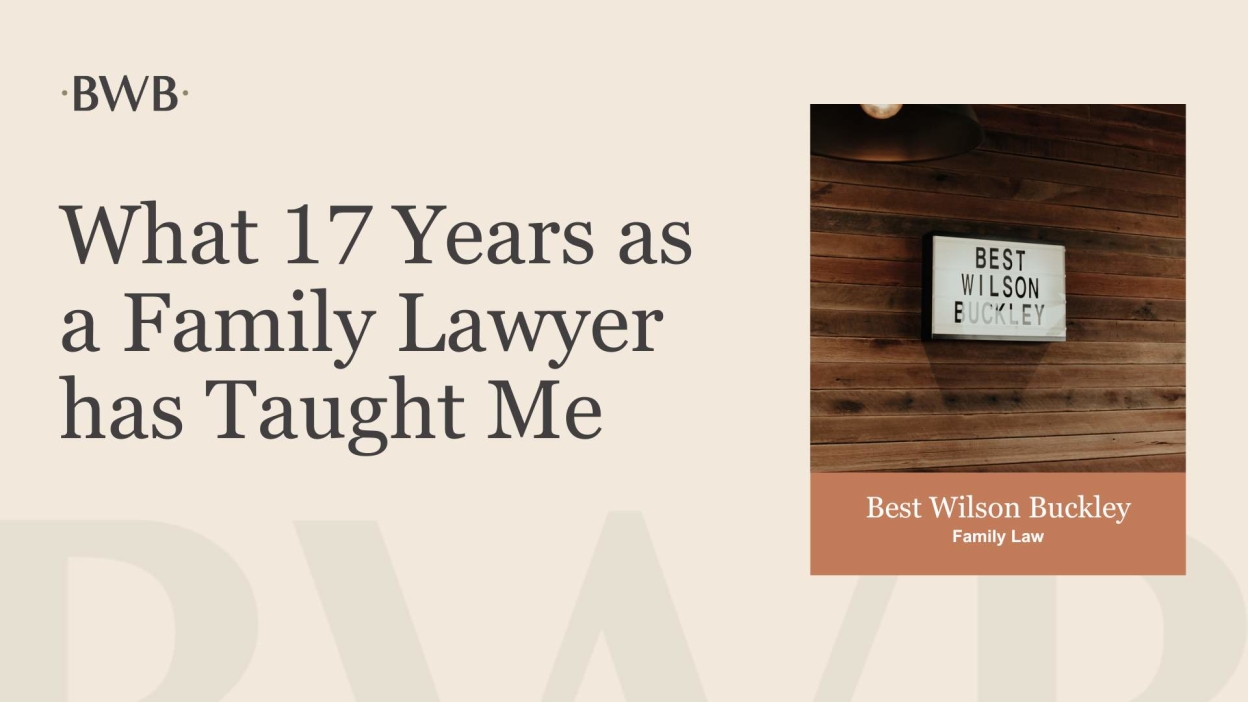What 17 Years as a Family Lawyer has Taught Me
By Best Wilson Buckley Family Law |24 January 2019 |Parenting Arrangements and Disputes-Articles

In December last year I celebrated the 17th anniversary of my admission to practice and my tenth year of practice as a Solicitor in my local community of Toowoomba. We have also entered a new period of growth and transition within Best Wilson Buckley Family Law in our tenth year – so a it is a beautiful time to reflect.
When I started university at 17, I thought I had life worked out - everything was very black and white. Now, 17 years into my legal practice I can say that life and legal practice have distinctly grey areas.
Seventeen years after commencing my career, I still have the same desire, passion and energy for those magic moments where my knowledge and understanding of the post-separation legal environment can tangibly make one of my clients feel stronger and more positive. As humans we all strive for connection at the end of the day. I really like that feeling when a client leaves our first meeting and their relief is tangible.
The other thing I love about this job is fixing a problem, or resolving a dispute. I genuinely like working with the majority of lawyers that I come into contact with. I work with many insightful and competent lawyers whom are equally focused on positive outcomes for both parties (and by implication their kids) but don’t sacrifice what it is to be a passionate advocate for their client’s needs. Reaching an agreement that works for both parties is hard work - much harder than litigating and acting without conscience to create even greater conflict between a child’s parents.
So, reflecting on this, what do I wish I appreciated in December 2001 in the way that I do now?
- - Very few of us set out into a new relationship with a view to breaking up. Relationships break down for a myriad of reasons, but in most instances it comes down to a couple who stopped connecting, communicating and striving to understand each other.
- - We love our kids - and again, in most instances, it’s really hard to be told that you’re not going to be able to be with them every day. The response is normally grief, and that takes time to work through.
- - That two loving parents can have two very different, but very genuine, views as to what is best for their kids in terms of how they spend their time.
- - The damage that we do to each other prior to, or around,
- - That carrying anger, bitterness and grief beyond a reasonable period of transition and healing can make you emotionally and physically sick and compromise your parenting.
- - There is an abundance of research that proves that it’s not your Mum and Dad separating that causes you damage as a child - it’s being exposed to parental conflict and all that goes with that.
- - That you need to learn a new way to communicate after separation, a way of drawing boundaries, exhibiting respect and supporting each other - and it’s hard to do and takes time.
- - That the best thing that extended family members can do is strive for that balance between supporting their sister, brother, daughter, son etc but not aligning with them against a former spouse.
- - That the Court will let both litigants and lawyers down - not because Judges and Court staff don’t have the best of intentions, but because the system is politically compromised, broken, burdened, under-resourced and lacking consistent direction.
- - I’ve never observed a client to endure a court process, including a long final hearing, delay to judgment, and potentially appeal, with the many months, legal costs and life in limbo and feel all that kindly towards their lawyer (or anyone else) at the end.
- - That the lawyers who adopt a bulldog aggressive attitude to this area of practice don’t succeed - it weathers them personally, the Court responds to them in a negative way and they’re not supported or often even trusted by their colleagues in practice.
- - That whilst I can have the best of intentions and try really hard, the nature of a couple’s conflict and/or the issues or personalities involved might mean that I can’t keep it on an amicable, collaborative pathway - and I need to be able to litigate and deal with the hostility that will often be misplaced and personally directed towards me.
- - That what I do has very little to do with the law, and more to do with giving my clients, and their former spouses, a vision for what can be possible moving forward and reminding them of it at regular intervals whilst effecting a legal solution.
- - That as a professional I need to leave judgment at the door - the experience of pain, fear and anger and what prompts these emotions is relative and whilst I might not have the same reaction, it’s important to both acknowledge and respect the response of both my client
- - That nobody wins in this area of law - and any lawyer who suggests otherwise is not the lawyer you need.
- - That the truly admirable, respected and effective
My list will continue to grow as time goes on, and perhaps that is learning number 17. There is something to learn with every new client and that is one of the reasons why it’s a privilege to work with a client going through possibly one of their worst experiences. It’s not smooth, it’s often very challenging and takes a personal toll, but every cloud has a silver lining and in this work, if you let yourself, you forge relationships with clients and colleagues that very few other areas of legal practice allow.